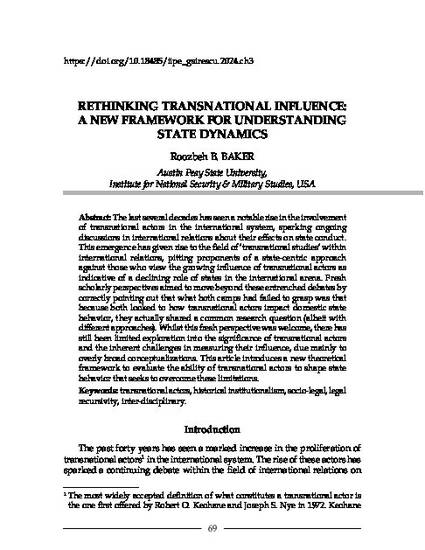
Contribution to Book
Rethinking Transnational Influence: A New Framework for Understanding State Dynamics
Global Security and International Relations After the Escalation of the Ukrainian Crisis
(2024)
Abstract
The last several decades has seen a notable rise in the involvement of transnational actors in the international system, sparking ongoing discussions in international relations about their effects on state conduct. This emergence has given rise to the field of ‘transnational studies’ within international relations, pitting proponents of a state-centric approach against those who view the growing influence of transnational actors as indicative of a declining role of states in the international arena. Fresh scholarly perspectives aimed to move beyond these entrenched debates by correctly pointing out that what both camps had failed to grasp was that because both looked to how transnational actors impact domestic state behavior, they actually shared a common research question (albeit with different approaches). whilst this fresh perspective was welcome, there has still been limited exploration into the significance of transnational actors and the inherent challenges in measuring their influence, due mainly to overly broad conceptualizations. This article introduces a new theoretical framework to evaluate the ability of transnational actors to shape state behavior that seeks to overcome these limitations.
Keywords
- transnational actors,
- historical institutionalism,
- socio-legal,
- legal recursivity,
- inter-disciplinary
Disciplines
Publication Date
Summer June 1, 2024
Editor
Dušan Proroković, Paolo Sellari, & Rich Mifsud
Publisher
Institute of International Politics & Economics / Sapienza University / Austin Peay State University / University of Belgrade, Faculty of Security Studies
ISBN
978-86-7067-328-1
DOI
https://doi.org/10.18485/iipe_gsirescu.2024.ch3
Citation Information
Roozbeh (Rudy) B. Baker, “Rethinking Transnational Influence: A New Framework for Understanding State Dynamics,” in Dušan Proroković, Paolo Sellari, & Rich Mifsud (Eds.), GLOBAL SECURITY AND INTERNATIONAL RELATIONS AFTER THE ESCALATION OF THE UKRAINIAN CRISIS (Belgrade: Institute of International Politics & Economics / Sapienza University / Austin Peay State University / University of Belgrade, Faculty of Security Studies 2024)
